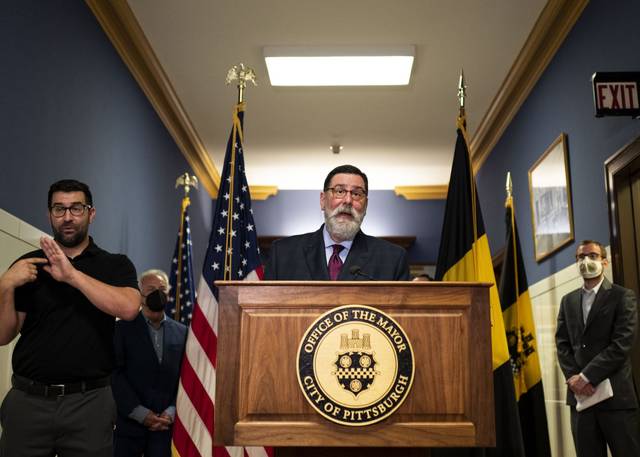https://staging.triblive.com/local/peduto-announces-115-million-in-commitments-from-nonprofits-including-upmc-highmark-pitt-and-cmu-for-onepgh/
Peduto announces $115 million in commitments from regional nonprofits for OnePGH

Pittsburgh Mayor Bill Peduto released a plan Thursday that could result in $115 million from the region’s nonprofits to fund affordable housing, recreation and social service programs. The funds would go through a new standalone entity called OnePGH.
“Today we are setting a new model for cities around the county and around the world, and we’re doing it the Pittsburgh way,” Peduto said during the announcement outside his offices in the City-County Building.
OnePGH has been talked about since 2018, Peduto noted, and the efforts to put it into place were underway years before that.
The coronavirus pandemic delayed it, but Peduto said the announcement wasn’t timed to come less than three weeks before the May 18 Democratic primary, where the mayor faces three opponents — state Rep. Ed Gainey, retired Pittsburgh police officer Tony Moreno and math tutor Michael Thompson — in his bid for a third term.
Gainey has particularly been critical of the Peduto administration’s handling of Pittsburgh’s nonprofits that are tax-exempt, like UPMC, Highmark, the University of Pittsburgh, Carnegie Mellon University, and the effort get them to contribute to the city’s budget.
In 2014, the Peduto administration dropped a lawsuit filed against UPMC challenging its tax-exempt status. If elected, Gainey has promised to take up the action again.
“This agreement is $135 million too little, seven years too late,” Gainey said in a statement.
One PGH Announcement $135M Too Little, 7 Years Too Late“For 7 years since the Peduto administration dropped the lawsuit challenging UPMC’s tax exempt status, no progress was made on securing a Payment-in-Lieu-of-Taxes."1/4 pic.twitter.com/wkxrYNplJf
— Gainey For Mayor (@GaineyForMayor) April 29, 2021
“I understand that the narrative of saying that nothing has been accomplished is useful for a political challenger, but the reality is we’ve moved farther during these past four years than any other administration has ever tried,” Peduto said. “We have been working diligently. I will say that covid put us back…but putting together something that has never existed in any city in the United States and being able to get the expertise that was needed… it was always more important that we did this project right than the timing.”
OnePGH wasn’t a negotiation between the city and its nonprofits, Peduto Chief of Staff Dan Gilman said. Instead, it was a collaborative effort that included socially-distanced meetings with nonprofit leaders in his Squirrel Hill back yard, Gilman said.
Peduto joked Gilman lost three years of his life working out the details of OnePGH.
It brings together the city’s largest nonprofits, University of Pittsburgh, Carnegie Mellon University, UPMC, Highmark Health, along with support from the Heinz Endowments, Hillman Family Foundations and the Richard King Mellon Foundation.
It should result in $115 million in funding over the next five years, Peduto said.
It unites the city’s leadership “under one common vision,” he said.
The projected contributions include:
• UPMC will invest $40 million in a affordable housing program and commit an additional $5 million per year to OnePGH initiatives to be determined each year.
• Highmark Health will invest $5 million per year to focus on OnePGH initiatives related to social determinants of health (an established model in the health-care field known as SDOH), providing services to city residents to address social and economic needs that determine a population’s general health. It also is co-responder of a program called Model, which will provide resources to better meet community needs through housing, social services, public health and social work experts who can assist first responders. In addition, a health disparities program will address the health care needs of underserved communities.
• Carnegie Mellon University will invest $4 million over five years for community recreation and arts projects, expanded education outreach and entrepreneurship programming, STEM and arts and humanities resources for K-12 students and educators, and administrative support of OnePGH.
• University of Pittsburgh will invest $8 million over five years in community engagement centers, green infrastructure, programming for seniors at Citiparks Healthy Active Living Centers and administrative support of OnePGH.
The model used by OnePGH already has found success in a $21 million homeless shelter that’s soon to be completed on Second Avenue.
It represents a collaborative effort by city and county leaders and Action Housing, the Allegheny Conference on Community Development, Allegheny Health Network, Highmark Health, Hillman Family Foundation, Pittsburgh Mercy and Operation Safety Net, PJ Dick, PNC and UPMC.
It is the first item to be checked in the 141-page prospectus that details the plans that will be pursued by OnePGH.
PNC Foundation, Citizens Bank and F.N.B. Corp. have also committed a combined $17 million to Invest PGH, a spinoff of the Urban Redevelopment Authority of Pittsburgh aims to spur community development by lending money to businesses that otherwise couldn’t borrow money.
OnePGH is a new approach to how cities can gain contributions from their nonprofit sectors in lieu of taxes, Peduto said.
Since 2005, the city has received a total of $34 million from nonprofits, Peduto said. And those contributions have been received and spent without oversight.
“There is no accountability and there is no outcome from it,” he said.
As a nonprofit itself, OnePGH will be required to make its spending public and Peduto said its operations will be transparent.
They also will be in line with the city’s gender equity plan and sustainable development goals that already are in place, Peduto said.
It will provide “one vision” that will allow the city to identify the issues that are important and measure how it addresses them, Peduto said.
“This groundwork over the next five years will be an experiment in urban partnerships for the 21st century,” he said.
Copyright ©2025— Trib Total Media, LLC (TribLIVE.com)
